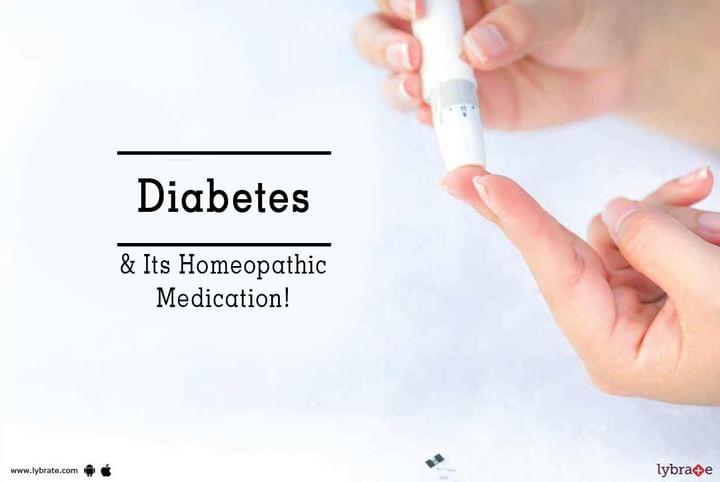Diabetes & Its Homeopathic Medication!
Diabetes is a state of persistent high blood sugar either due to lack of the hormone called insulin or resistance to the action of insulin even if it is somewhat adequate. Few basic points for the readers before we delve into how the medicines act in controlling blood sugar.
1. Type 1 Diabetes occurs in children or adults aged less than 30 years. It is due to the complete destruction of the insulin-producing cells of the pancreas. (these patients will need external insulin for survival as there is NO insulin in the body)
2. Type 2 Diabetes occurs in adults usually over the age of 30 years and it appears after 80% of the insulin-producing cells of the pancreas are destroyed. (Since there is some amount of insulin in the body, these patients respond to medicines)
3. Insulin helps the glucose in the blood to be pushed inside the cells of different organs especially liver and muscles and thus decrease the blood glucose levels.
4. Type 2 Diabetes patients often suffer insulin resistance, which means, whatever insulin they have in them, is unable to perform to its best due to obesity , extra fats in the tissues and other hormonal dysregulation. Drugs that help to overcome insulin resistance can help in the control of blood sugar without external insulin.
Now let's discuss the medications in brief.
1. Metformin:
- This medicine acts by overcoming insulin resistance. Since it simply helps our endogenous insulin (our own residual insulin) to act in its full potential, the chances of fall in blood sugar below 70mg/dL (Called Hypoglycemia) is practically ZERO.
- The maximum dose is 2500mg per day in divided doses
- Side effects are gastritis, acidity, flatulence and diarrhoea. Rarely we get cases of Vitamin B12 deficiency.
- Can be combined with any medication used for Diabetes
- Cannot be used in patients with Kidney Disease (Create >1.5mg/dL), Heart Failure, Immediately after a heart attack or complicated septicemia.
- Safe in pregnancy.
- Due to their unique action in overcoming insulin resistance, they are used in females who suffer from Polycystic Ovarian Disease (as they also do have insulin resistance)
2. Glimepiride/Gliclazide/Glibenclamide/Glipizide/Glyburide/Repaglinide:
- Yes, they sound similar and they belong to the same family of drugs called Sulfonylureas
- They can directly stimulate the release of endogenous insulin from the pancreas into the blood which in turn controls the blood sugar.
- Yes, they are notorious to cause hypoglycemia as the amount of insulin released due to the use of these drugs does not always tally mathematically with the dose administered.
- Chances of Hypoglycemia increases with higher doses, delay in meal timings, excessive exercises, alcoholism, kidney diseases, concomitant use with external insulin and fasting. The crucial times when hypoglycemia occurs are before breakfast, before lunch, before dinner and around 3 to 4 hours after lunch.
- They can be combined with metformin and other antidiabetic medicines too.
- They can cause mild weight gain due to the action of the released insulin.
3. Pioglitazone:
- This one acts similar to metformin and helps in overcoming the resistance to the action of our endogenous insulin.
- Since they cause accumulation of fluids in the body, they are not indicated in patients suffering from Chronic Heart Failure, Chronic Liver Failure or any volume overload states.
- There has been speculation for development of urinary bladder cancer which resulted in discontinuation of this drug, however, the incidence is so low, the drug has been reinstated.
- The dose ranges from 15mg to 30mg/day often combined with metformin.
4. Acarbose/Voglibose:
- These medicines have a unique mechanism of action. They act in the intestine where they prevent the complex carbohydrates to be broken down into simple glucose before being absorbed into the blood from our gut. For a clearer conception, whatever we eat, is actually digested by the enzymes in our intestine to the simplest form e.g Cellulose is digested into Glucose and then they are absorbed into the blood. Complex carbohydrates cannot be absorbed into a blood unless they are digested first.
- This unique mechanism of action causes excess complex carbohydrates remaining undigested and this bulk reach the colon where they are acted upon by colonic bacteria. This causes excessive flatulence - one of the known side effects of these drugs.
- Point to be noted: In a situation, a patient consuming these drugs suffers hypoglycemia, they should be provided oral glucose to increase the blood sugar. Even a piece of chocolate or sweet might contain a significant amount of sweetening carbohydrates which actually is complex in nature and will not breakdown to glucose in the intestine due to these medicines.
- They are often used to control patients who tend to have higher blood sugar values after meals (Raised PP Sugar)
5. Gliptins: (Teneligliptin, sitagliptin, saxagliptin, linagliptin, vildaglitpin)-
- They have a unique mechanism of action and is a bit complicated. They act in the intestine where they can sense what amount of carbohydrate load is being consumed in the diet. This sensing then is transmitted to the insulin-releasing cells of the pancreas and an exact amount of insulin is released that is necessary to control the transient rise in blood sugar after meals.
- They do not have the propensity to cause hypoglycemia even in a fasting state.
- No significant adverse effects of concern have been reported.
- They are costlier that the medicines mentioned above.
- Some of them cannot be used in patients with kidney disease. Linagliptin is safe in this regard.
- Few instances of acute pancreatitis have been reported.
6. Glifosins : (empraglifosin/ dapaglifosin/ empaglifosin)-
- These are the latest drugs in the armamentarium of management of Diabetes. They are costly and effective
- Normal urine is basically an ultrafiltrate of our blood which is filtered and formed in the kidneys. The kidney actually filters all excretory products of metabolism from the blood e.g. Urea, Creatinine Uric Acid, Calcium, Organic Acids, and excess water. Interestingly some useful products are also primarily filtered but later they are reabsorbed in the blood eg. Glucose, Sodium, Potassium, etc.
- These medicines prevent the reabsorption of the Glucose after it is primarily filtered from the blood during the formation of the urine. Thus the glucose which is filtered never returns to the blood and is lost by the urine
- These medications cause weight loss. Yes, they do. Around 5 to 6 Kgs over a period of 3 to 6 months have been reported.
- Since the urine becomes rich is glucose concentration, one important adverse effects of these medications are dehydration and recurrent urinary tract infection. Both are more common in elderly women. Some might also complain of repeated perivaginal itching which is due to increased bacterial growth due to high sugar content in the urine
- Volumes of water are recommended for regular consumption when somebody is on this medication
This is just a summary of the oral medications available for the management of Type 2 Diabetes Mellitus. Few points for the readers.
1. Usually, treatment is started with metformin and the dose is gradually increased up to the maximum dose or up to the level of tolerance.
2. The next medicine that is added in case the blood sugar is just out of the range is Pioglitazone, however, in case the blood sugar is significantly high, doctors prefer to add the Sulfonylureas (Glimiperide /Glicazide, etc).
3. Ideal treatment should address insulin resistance first and then target insulin release.
4. Gliptins are the third line drugs or can be used just after metformin is maximized depending on the patients' profile and doctors evaluation.
5. Sometimes Voglibose and Acarbose are used just before the meals to control the disproportionate high postprandial blood sugars in a situation when the fasting is well under control.
6. Caution regarding Hypoglycemia should always be observed when a patient is on the Sulfonylurea group of medications. Keep 2 to 3 packs of sugar along with.
7. Use of gliosis is often restricted due to its cost else, it is a fantastic medicine to lose weight.



+1.svg)
